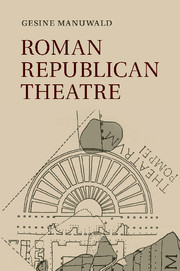Book contents
- Frontmatter
- Contents
- Preface
- Technical notes and abbreviations
- Introduction: previous scholarship and present approach
- PART I CULTURAL AND INSTITUTIONAL BACKGROUND
- PART II DRAMATIC POETRY
- 3 Dramatic genres
- 4 Dramatic poets
- 5 Dramatic themes and techniques
- Overview and conclusions: Republican drama
- Bibliography
- Index
5 - Dramatic themes and techniques
Published online by Cambridge University Press: 05 July 2011
- Frontmatter
- Contents
- Preface
- Technical notes and abbreviations
- Introduction: previous scholarship and present approach
- PART I CULTURAL AND INSTITUTIONAL BACKGROUND
- PART II DRAMATIC POETRY
- 3 Dramatic genres
- 4 Dramatic poets
- 5 Dramatic themes and techniques
- Overview and conclusions: Republican drama
- Bibliography
- Index
Summary
‘TRANSLATION’ AND GREEK INTERTEXTS
Roman ‘literary’ drama came into being through the production of serious and light dramas in Latin based on Greek precursors, while genuine Roman ‘literary’ dramatic genres were developed later. Hence the question of how Roman dramas relate to Greek predecessors has always been an important issue in discussions of Roman drama. In a narrow sense this problem affects mainly crepidata and palliata, the two dramatic genres that are based on Greek (classical) tragedy and Greek (New) comedy. In a wider sense the relationship to Greek literature is relevant for all varieties of Republican drama, since the other dramatic genres, although presenting Roman subject matter and/or emerging from indigenous forerunners, were established fully only after the appropriation of Greek drama in Rome, so that dramatic structures and/or motifs of Greek drama will have influenced Roman ‘literary’ drama more generally.
Due to fragmentary transmission or even almost complete lack of evidence for plays of some dramatic genres and periods on both the Greek and the Latin sides, clear-cut answers are not easy, and this is probably one reason why the issue remains a controversial question. Scholars' answers range from the view that Greek-based Roman plays are basically literal translations of Greek models to the opinion that Roman poets used Greek dramas as starting points, but transformed them into plays suitable for Roman audiences rather freely and might sometimes not even have used a specific Greek dramatic model.
- Type
- Chapter
- Information
- Roman Republican Theatre , pp. 282 - 330Publisher: Cambridge University PressPrint publication year: 2011
- 1
- Cited by



